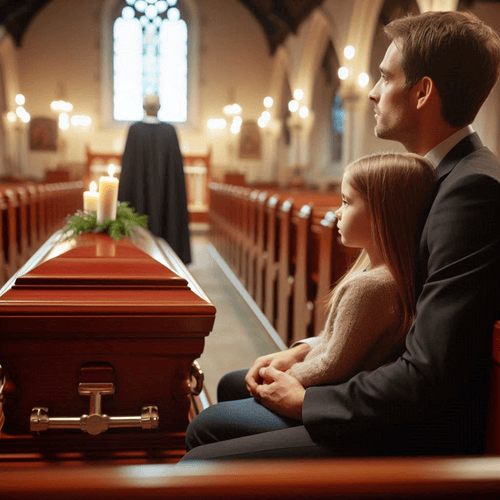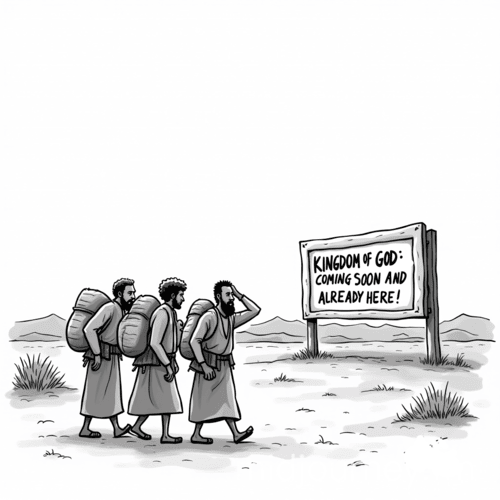What Happens to Our Souls When We Die?
Death remains humanity’s great mystery. Whether we’re sitting beside a loved one’s hospital bed, attending a funeral, or simply lying awake at 3 AM contemplating our own mortality, we all wonder: what happens next? Where do we go when we die?
For those who hold to the Reformed tradition of Christianity, Scripture provides clear and comforting answers to these profound questions. The Bible reveals death isn’t the end of our story, but rather a transition from this life to the next. Let’s explore what God’s Word teaches about the soul’s journey after death.
WHAT HAPPENS TO OUR SOULS WHEN WE DIE? IMMEDIATELY PRESENT WITH THE LORD
The first truth that brings tremendous comfort is this: when a believer dies, their soul immediately enters the presence of Christ. The apostle Paul puts it beautifully in 2 Corinthians 5:8, saying we are “absent from the body and present with the Lord.” There’s no delay, no waiting period, no uncertaintythe moment we breathe our last breath on earth, we take our first breath in glory.
Paul reinforces this truth in Philippians 1:21-23, where he expresses his desire “to depart and be with Christ, which is better by far.” If there were some lengthy waiting period or unconscious state, Paul’s eagerness wouldn’t make sense. Instead, he looks forward to death because it means immediate fellowship with Jesus.
Consider Jesus’ words to the thief on the cross: “Today you will be with me in paradise” (Luke 23:43). Not someday, not eventually, but today. This promise extends to every believer—the moment we die, we are with Christ.
This immediate transition happens because at death, the soul separates from the body. While our physical bodies return to dust, our souls—the essence of who we are—continue to exist consciously in the presence of our Saviour.
THE INTERMEDIATE STATE: CONSCIOUS AND BLESSED
This period between death and Christ’s return is called the intermediate state. During this time, believers exist as souls without bodies, consciously enjoying fellowship with Christ and other believers who have gone before.
The Westminster Confession of Faith describes this beautifully: “The souls of the righteous, being then made perfect in holiness, are received into the highest heavens, where they behold the face of God in light and glory.” This isn’t soul sleep, as some traditions teach, nor is it purgatory, as Roman Catholics believe. Instead, it’s a state of conscious blessedness.
What makes this state so wonderful?
- Believers are finally free from sin. The struggle with temptation, the weight of guilt, the battle against our fallen nature—all of this ends at death. We are made perfect in holiness, experiencing the joy of complete righteousness.
- We’re free from all suffering. No more pain, no more sorrow, no more anxiety or fear. The tears we’ve shed in this life are wiped away, and we experience the perfect peace that comes from being in God’s presence.
- We enjoy fellowship with Christ and with all the saints who have gone before us. Imagine the conversations, the worship, the joy of being reunited with loved ones who died in faith! While we don’t have bodies yet, we remain ourselves—conscious, personal, and capable of relationship.
THE FINAL RESURRECTION: COMPLETE RESTORATION
As wonderful as the intermediate state is, it’s not our final destination. The Bible promises something even better: the resurrection of the body. When Christ returns, He will raise the dead, and our souls will be reunited with our bodies—but not the same bodies we had before. They will be glorified, transformed, and perfected.
Paul explains this mystery in 1 Corinthians 15, comparing our current bodies to seeds that die and are transformed into something far more glorious. Just as Jesus was raised with a glorified body that was recognisably His yet transformed, so too will our bodies be raised imperishable, powerful, and spiritual.
This bodily resurrection is crucial to the Reformed understanding of salvation. We are not just souls temporarily trapped in bodies—we are embodied souls, created to live as whole persons. God doesn’t just save our souls; He saves us completely, body and soul together.
At this resurrection, we will inherit the new heavens and new earth described in Revelation 21-22. This isn’t some ethereal, spiritual realm, but a renewed creation where we will live as complete persons—body and soul—in perfect fellowship with God forever.
LIVING IN LIGHT OF ETERNITY
Understanding what happens after death isn’t just theological speculation—it has profound implications for how we live today.
- It brings comfort in grief. When we lose a Christian loved one, we don’t “sorrow as those who have no hope” (1 Thessalonians 4:13). We know they are with Jesus, free from pain and sin, experiencing perfect joy. This doesn’t eliminate our grief—we miss them terribly—but it seasons our sorrow with hope.
- It motivates holy living. Knowing that we will be made perfect in holiness reminds us that this is our ultimate destination. We can fight against sin with confidence, knowing that our struggle is temporary and victory is certain.
- It provides hope in suffering. Paul reminds us that “our present sufferings are not worth comparing with the glory that will be revealed in us” (Romans 8:18). Whatever difficulties we face in this life, they pale in comparison to the eternal weight of glory awaiting us.
- It creates urgency in evangelism. Death brings finality—after we die, our eternal destiny is sealed. This truth compels us to share the gospel with those who don’t yet know Christ, knowing that only through faith in Him can anyone experience the blessed hope we’ve described.
WHAT HAPPENS TO OUR SOULS WHEN WE DIE? OUR BLESSED HOPE
So what happens to our souls when we die? For those who trust in Christ, death isn’t the end but the beginning of something far better. We go immediately to be with Jesus, we exist consciously in His presence, and we await the glorious resurrection when our bodies will be raised and we will inherit the new creation.
This is the Reformed tradition’s answer to humanity’s greatest question, rooted firmly in Scripture and confirmed by centuries of faithful teaching. It’s a hope that transforms how we live, how we grieve, and how we face our own mortality. In Christ, death has lost its sting, and we can say with confidence: “To live is Christ, and to die is gain.”
WHAT HAPPENS TO OUR SOULS WHEN WE DIE? RELATED FAQs
What happens to infants and young children who die before they can express faith? Reformed theology has generally held to infant salvation, following the Westminster Confession’s teaching that “elect infants, dying in infancy, are regenerated and saved by Christ.” John Calvin believed God’s mercy extends to covenant children, and many Reformed theologians like BB Warfield and John MacArthur have argued all infants who die go to heaven. While the exact mechanism remains mysterious, Reformed scholars trust in God’s justice and mercy for those who cannot yet believe.
- Do believers have any awareness of events on earth while in the intermediate state? Reformed theologians are divided on this question. John Calvin was cautious about claiming too much knowledge, while others like Jonathan Edwards suggested some awareness might exist. The Westminster divines remained silent on this issue, focusing instead on the blessed reality of being with Christ. Most contemporary Reformed scholars emphasise the knowledge believers might have doesn’t diminish their perfect peace and joy in God’s presence.
- How do Reformed theologians explain Jesus’ parable of the rich man and Lazarus? They generally interpret this as a literal description of the intermediate state, not merely a parable. Calvin, Matthew Henry, and modern theologians like RC Sproul see it as evidence for conscious existence after death and the great gulf between the saved and unsaved. The parable supports the Reformed view that death brings immediate conscious existence in either blessedness or torment, contradicting theories of soul sleep.
What about cremation versus burial—does it affect the resurrection? Reformed theology has consistently taught the method of disposing of the body doesn’t affect God’s ability to resurrect it. John Calvin addressed this directly, noting God can raise bodies whether they decay naturally, are consumed by fire, or scattered by wind. The Westminster Confession emphasises “the very same bodies” will be raised, but this refers to personal identity, not physical particles. Contemporary Reformed scholars like Wayne Grudem affirm cremation poses no obstacle to resurrection.
- Why do we reject the doctrine of purgatory? We reject purgatory because it undermines the sufficiency of Christ’s atoning work and contradicts the doctrine of justification by faith alone. Calvin argued purgatory implies Christ’s sacrifice was incomplete and that we contribute to our own purification. The Westminster Confession teaches believers are “made perfect in holiness” immediately upon death, not gradually through purgatorial suffering. This position maintains sanctification is completed by God’s grace alone, not through post-mortem purification.
- How do we handle difficult passages like 1 Peter 3:19 about Christ preaching to “spirits in prison”? Reformed theologians offer various interpretations of this challenging passage. Calvin understood it as Christ proclaiming victory over demonic spirits, while others like Wayne Grudem see it as Christ (through the Spirit) preaching through Noah to his contemporaries. Most Reformed scholars reject the idea that this describes a second chance for salvation after death, as it would contradict the clear biblical teaching that “it is appointed for man to die once, and after that comes judgment” (Hebrews 9:27).
What do Reformed theologians say about near-death experiences and their accounts of the afterlife? They generally approach near-death experiences with caution, neither dismissing them entirely nor treating them as authoritative revelation. Theologians like John MacArthur and RC Sproul noted these experiences often contradict biblical teaching about judgement and the exclusivity of salvation through Christ. While acknowledging that some experiences might reflect genuine spiritual encounters, Reformed theology maintains Scripture alone is our reliable guide to understanding the afterlife, not subjective experiences that can be influenced by various factors.
WHAT HAPPENS TO OUR SOULS WHEN WE DIE? OUR RELATED POSTS
Editor's Pick

Paul’s Mandate for Men: Headship Or Servant Leadership? Or Both?
Modern Christianity has fallen into a trap. We've created an either/or battle between "headship" and "servant leadership," as if these [...]

Should We Stop Using Male Pronouns for God? Why Do We Say No?
A friend of ours arrived eagerly at his first theology class in seminary. But he quickly discovered something troubling: the [...]

Did Old Testament Law Force Women to Marry their Rapists?
**Editor’s Note: This post is part of our series, ‘Satan’s Lies: Common Deceptions in the Church Today’… Viral misinformation abounds [...]

From Danvers To Nashville: Two Statements, One Biblical Vision
30 years separate the Danvers Statement on Biblical Manhood and Womanhood (1987) and the Nashville Statement on Human Sexuality (2017). [...]

The Nashville Statement: Why Affirm It Despite Media Backlash?
WHY DO REFORMED CHRISTIANS STAND BY THIS STATEMENT ON MARRIAGE AND GENDER? When the Nashville Statement was released in 2017, [...]

Who Is Belial? Solving The 2 Corinthians 6:15 Mystery
Belial: This name from the pages of Scripture chills the soul. Who is this mysterious figure Paul invokes in 2 [...]

Celibacy Or Castration: What Jesus Really Means in Matthew 19:12
One of Scripture's most shocking misinterpretations led theologian Origen to castrate himself in the third century. His tragic mistake? Taking [...]

Philippians 4:13: Did Paul Really Mean We Can Do ALL Things?
"I can do all things through Christ who strengthens me." It's on gym walls, graduation cards, and motivational posters everywhere. [...]

The Ordinary Means of Grace: Why Are They Indispensable?
ORDINARY MEANS FOR EXTRAORDINARY TRANSFORMATION What if God's most powerful work in believers' lives happens through the most ordinary activities? [...]

Is the Bible God’s Word? Or Does It Only Contain God’s Word?
The authority of Scripture stands at the crossroads of modern Christianity. While some argue the Bible merely contains God’s Word [...]
SUPPORT US:
Feel the Holy Spirit's gentle nudge to partner with us?
Donate Online:
Account Name: TRUTHS TO DIE FOR FOUNDATION
Account Number: 10243565459
Bank IFSC: IDFB0043391
Bank Name: IDFC FIRST BANK






